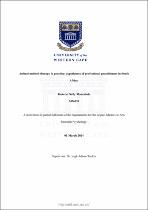| dc.description.abstract | Animal-assisted therapy (AAT) has gained much interest in healthcare settings internationally. AAT involves collaborating with animals to improve mental and physical health. Studies have shown that AAT can reduce stress, anxiety, and depression, and promote social support. However, implementing this complementary healing modality – and assessing its effectiveness – within health and social services is still lacking. The literature on AAT is minimal in the African context, but it is a growing area of interest. This study aims to understand the experiences of AAT professionals' (certified psychologists, psychiatrists, registered counsellors, occupational therapists, and physiotherapists, as well as professionals working in social services, education, and animal health and training), in terms of how animals are incorporated into the therapeutic setting and the benefits and challenges of practicing within AAT. | en_US |

